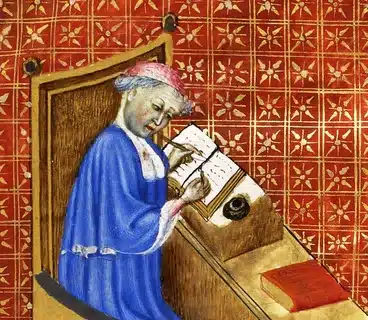Nicole Oresme is one of the most significant thinkers of medieval Europe, known for his contributions to the fields of science and philosophy.
Nicole Oresme’s early life began between 1320 and 1325 in France. From a young age, Oresme was noted for his exceptional intelligence and learning abilities. He completed his education at the University of Paris, where he studied extensively in the areas of mathematics, astronomy, philosophy, and theology. His education at the University of Paris played a crucial role in shaping his scientific thoughts and in his subsequent academic career.
Oresme’s academic and church relations held a significant place in his career. Academically, he served as a professor at the University of Paris and devoted much of his time to teaching and research. His relationship with the church was more complex. Oresme was known for his critical approach to some of the church’s teachings; although this led to some tensions with religious authorities, he was nevertheless recognized and respected by the church as a scientist.

Scientific and Mathematical Works of Oresme
Nicole Oresme has done innovative work in many fields, especially mathematics and physics.
Innovations and Contributions in Mathematics
Oresme’s innovations in mathematics were particularly evident in the fields of geometry and number theory. He created one of the first examples of coordinate geometry and promoted the use of mathematics as a universal language by developing some concepts in algebra. In addition, his studies on proportional calculations and the theory of ratios laid the foundations of mathematical analysis in later periods.
Approaches to Physics and Cosmology
Oresme’s approaches to physics and cosmology are among his most revolutionary ideas. Oresme carried out studies that challenged Aristotle’s theories of physics and advocated an understanding of science based on observations. He is also considered one of the first thinkers to theorize about the Earth’s rotation. His approach to cosmology involved radical ideas about understanding the structure of the universe, and these ideas inspired later studies of astronomy and physics.
Nicole Oresme and Philosophy
Nicole Oresme’s works in philosophy attract attention, especially with her thoughts on natural philosophy and ethics.
Natural Philosophy and Metaphysical Views
Oresme’s natural philosophy and metaphysical views are ideas that pushed the boundaries of Medieval thought and laid the foundations of the modern scientific method. Oresme is one of the first thinkers to argue that nature can be explained with mathematical principles and therefore that the universe has a deterministic structure. His metaphysical views include theoretical speculations on existence and becoming, and with these thoughts he paved the way for the mechanical philosophy that would develop in later periods.
His Thoughts on Economics and Ethics
Oresme’s thoughts on economics and ethics are particularly concentrated in the areas of monetary theory and moral responsibility. He was one of the first economists to point out that the value of the currency does not remain constant and can change with economic factors. In addition, the texts he wrote on economic justice and ethical norms formed the philosophical foundations of economics.
Oresme’s Written Works and Translations
Nicole Oresme’s written works and translations show that she is a versatile scientist and thinker.
Important Books and Texts
Oresme’s major books and texts cover a wide range of knowledge and thought. These include mathematical and philosophical works such as “De proportionibus proportionum” and “De latitudinibus formarum”. These books made great contributions to the development of scientific and mathematical thought in Medieval Europe.
Translations from Latin to French and Their Importance
Oresme’s translations from Latin to French are important works that enable information to reach wider audiences. These translations contributed to the democratization of knowledge by bringing the scientific and philosophical texts of the period to a wider audience. In particular, the translations of Aristotle’s works had a great impact in the French world of thought and played a key role in the spread of scientific thought.
Oresme’s Contributions and Influence to Science
Nicole Oresme’s contributions to science clearly demonstrate her influence on the world of science in the Middle Ages and later periods.
Effects on Medieval Science
Oresme’s influences on medieval science were revolutionary, especially in the fields of mathematics and physics. Oresme reshaped the understanding of science of the period with mathematical principles. The theories he developed on astronomy and mechanics laid the groundwork for the work of future generations of scientists such as Galileo and Kepler. These studies have radically changed the way science understands and explains natural phenomena.
The Legacy He Left to the Next Generations
The legacy that Oresme left to subsequent generations emerges from the constant rediscovery and evaluation of his work. His theories were frequently referenced in discussions about science and philosophy during the Renaissance and helped lay the foundations of the modern understanding of science.
Nicole Oresme’s Influences on Modern Science and Thought
Oresme’s contributions to science have also left a deep impact on modern science and thought.
Reflections of Oresme’s Theories in Modern Science
The reflections of Oresme’s theories in modern science demonstrate the timeless value of his work. In particular, his views on cosmology and physics paved the way for Newton’s formulation of his laws of motion and modern theories such as Einstein’s theory of relativity. Oresme’s observations on the nature of motion and force made important contributions to the development of modern physical sciences.
Contemporary Evaluation of Oresme’s Views
Contemporary evaluation of Oresme’s views reveals that his ideas remain relevant not only historically but also in contemporary scientific and philosophical debates. For example, Oresme’s thoughts on economics show parallels with today’s economic theories. Additionally, Oresme’s mathematical and physical theories are still used as inspiration in many interdisciplinary studies in modern science.